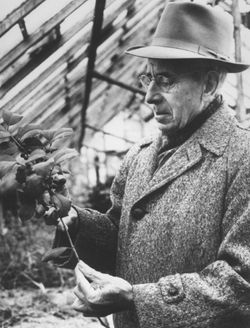
Francis J. LeClair
Oakland Township
Botanist, Horticulturist and Landscape Architect
Francis J. LeClair was born in Belgium, but later emigrated to the United States. Working in many nurseries across the nation, LeClair developed his horticulture and botany skills. Later, after finding employment with the United States Government, LeClair traveled to North Carolina. During his time in North Carolina, LeClair resided on his farm in the Oakland Township outside of Pittsboro, located now is called Holly Ridge Road. LeClair also worked for the University of North Carolina at Chapel Hill at one point being promoted to the university’s landscape architect. LeClair not only created many natural settings at the university including the Morehead Planetarium’s Rose Garden but also developed new variations of hollies such as the “Pearle LeClair,” named after his wife.
Francis J. LeClair was born June 21, 1884 in Antwerp, Belgium. In 1904, LeClair graduated from the State School of Horticulture near Brussels, Belgium. The following year, LeClair emigrated to the United States of America.
In his early career, he worked in Baltimore, Philadelphia, Washington, D.C. and New York. In these cities, he worked in nurseries.
Later, he was hired by the United States Government where he held various positions. In the early 1930s, LeClair was working for the United States Soil Conservation Service. This work sent him to North Carolina. LeClair’s work in North Carolina started with responsibilities such as choosing grasses to control erosion in coastal areas.
In 1939, LeClair was appointed to be a landscape gardener at the University of North Carolina at Chapel Hill. Later, LeClair was promoted to become the University of North Carolina’s landscape architect.
LeClair took much interest in creating landscapes that beautified the University of North Carolina’s campus. He had a special interest in planting evergreens across the campus to promote color throughout the winter season and soften the university’s stone and brick buildings. LeClair grew over 120 varieties of hollies, planting many throughout the university's campus.
One such holly that LeClair developed and introduced was called the “Pearle LeClair,” named after LeClair’s wife and regarded for its bright red fruits. The “Pearle LeClair” can be found today at the Coker Arboretum.
Some of LeClair’s most memorable landscape designs can be found in the rose garden in front of the Morehead Planetarium and the Old Well’s remodeling.
LeClair retired as the University of North Carolina’s landscape architect on November 7, 1957. After his retirement, LeClair continued to serve the university as landscape consultant. LeClair spent his retirement growing hollies and other plants at his Chatham County farm called Holly Ridge. After LeClair’s death, the farm was sold to a young family from Pittsboro. The family later renamed the road Holly Ridge Road in honor of LeClair. Remnants of his landscaping can still be found on the property.
In 1956, LeClair was awarded a resolution of commendation “for his notable contribution to the beauty of the campus” from the university's Faculty Council. Later, he was further honored by the university's Botany Department, now Biology Department, with the creation of the annual Francis J. LeClair Award in Botany, first awarded in 1974.
On November 11, 1973, LeClair passed away. He is buried in the Old Chapel Hill Cemetery in Section III, plot A12. Burial at the Old Chapel Hill Cemetery is an honor for those who dedicated their time or resources to the university.
 |  |  |  |
|---|
Sources
The University of North Carolina Herbarium
Town of Chapel Hill - The Old Chapel Hill Cemetery
NC Botanical Garden - LeClair
Winston-Salem Journal - Tar Heel Tripping
Find A Grave - Francis LeClair
UNC - Discover
*Click the Spotify logo above to listen to the full podcast.